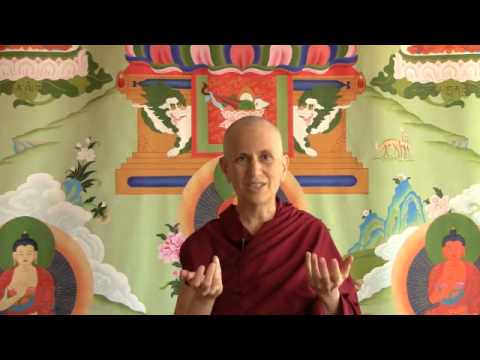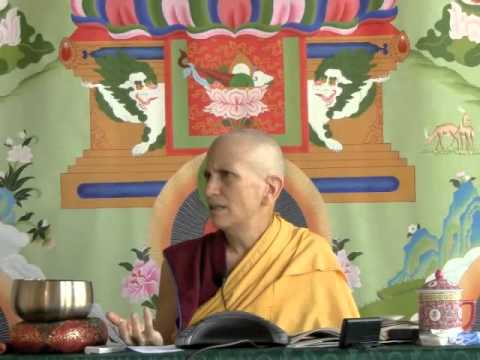Mindfulness and introspective awareness
Stages of the Path #117: The Fourth Noble Truth
Part of a series of Bodhisattva's Breakfast Corner talks on the Stages of the Path (or Lamrim) as described in the Guru Puja text by Panchen Lama I Lobsang Chokyi Gyaltsen.
- The importance of mindfulness in all three higher trainings
- Remembering our precepts
- Being mindful of our actions of body, speech, and mind
We’ve been talking about the three higher trainings. In all three higher trainings the factors of mindfulness and introspective alertness are very important.
We start out with them in the higher training of ethical conduct with mindfulness being the mental factor that remembers our precepts. It remembers the ethical conduct, how we want to live, how we want to act. Then introspective alertness checks up and sees if we are acting that way, if we are keeping our precepts. More specifically with introspective alertness, in this higher training of ethical conduct, we become very aware of what is happening with our body, speech, and mind. It’s an introspective mind that is aware of “what am i doing, what am I saying, what am I thinking.”
There are many passages in both the Pali and the Sanskrit texts that talk about how a monastic practices in this way—how anybody should practice—so that when you’re going somewhere you’re aware of where you’re going, why you’re going there, how you’re moving. When you’re speaking you’re aware of what you’re saying, how you’re saying it, why you’re saying it. In all actions, whether we’re standing or lying down or sitting or moving there’s an awareness of what we’re doing, and also if what we’re doing is what we should be doing. Or if what we’re doing is what we should not be doing at that moment. Or if we’re doing it in an ungraceful way or a very harsh way, or whatever. Really having that awareness. And the more we can build on that from day to day then the more refined our behavior becomes.
Even in situations, let’s say, when we’re chanting, that also requires mindfulness and introspective alertness. When we’re chanting we need to be mindful of what the melody is (because mindfulness has to do with memory), remember what the melody is, remember what the words are, remember when to ring the bell. We also have to have introspective alertness that is checking up and seeing “How am I doing that? Am I trying to be on pitch or am I just chanting my own thing because I’m not listening to anybody? Am I ringing the bell when I need to be ringing it, or do I forget to ring it and then it comes out one or two beats afterwards…” Just on this very practical level in our lives—to do with our very gross verbal and physical actions—mindfulness and introspective awareness are very, very important. And this is necessary in order to develop these two qualities in our meditation, which I’ll speak about tomorrow. Let’s try and keep this in mind in terms of our physical and verbal actions.
Venerable Thubten Chodron
Venerable Chodron emphasizes the practical application of Buddha’s teachings in our daily lives and is especially skilled at explaining them in ways easily understood and practiced by Westerners. She is well known for her warm, humorous, and lucid teachings. She was ordained as a Buddhist nun in 1977 by Kyabje Ling Rinpoche in Dharamsala, India, and in 1986 she received bhikshuni (full) ordination in Taiwan. Read her full bio.


